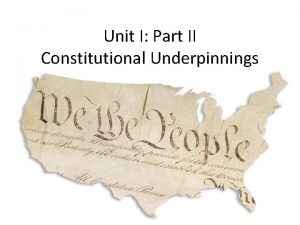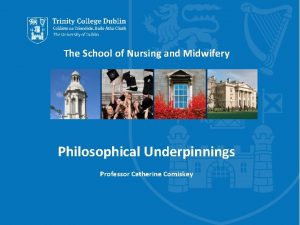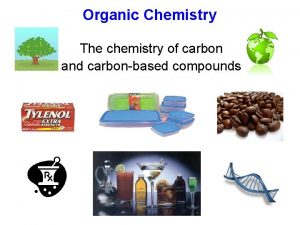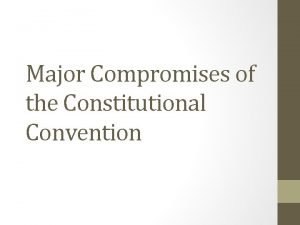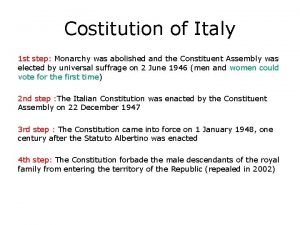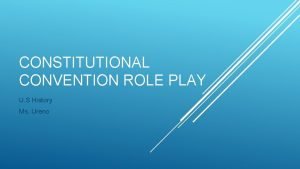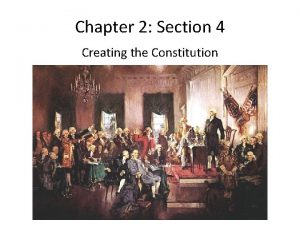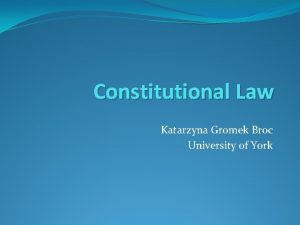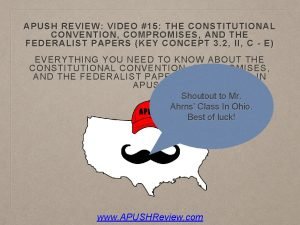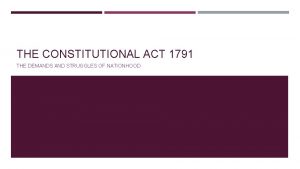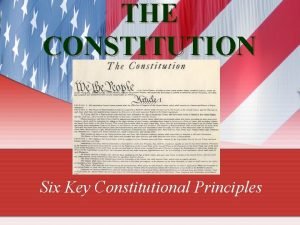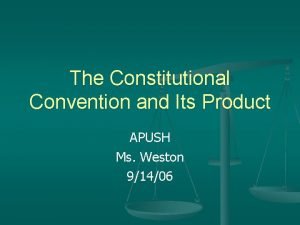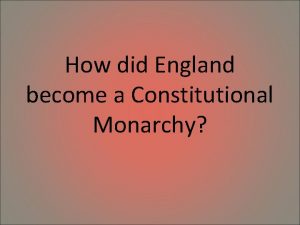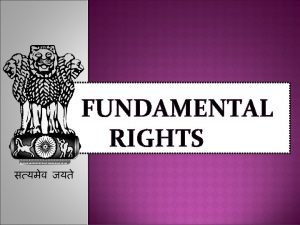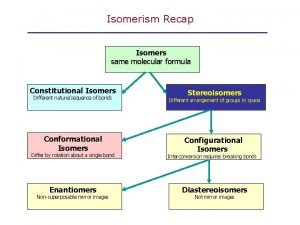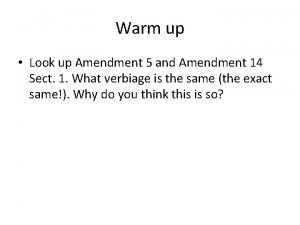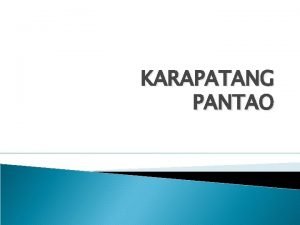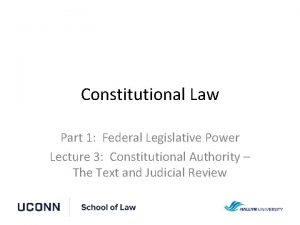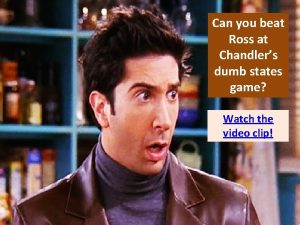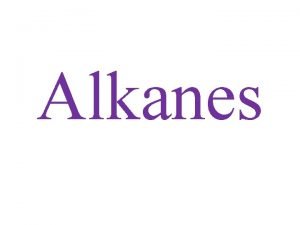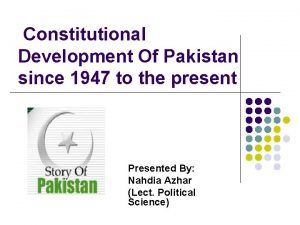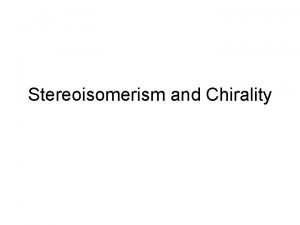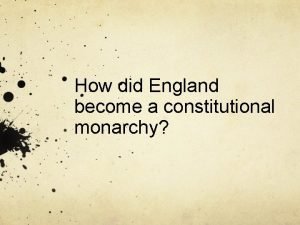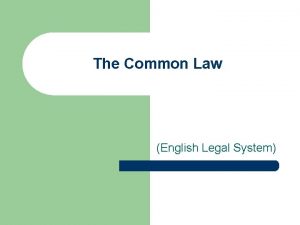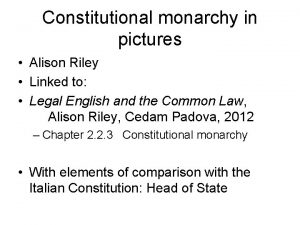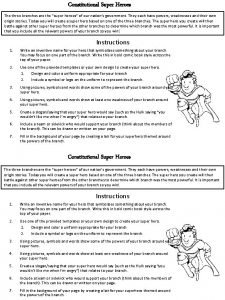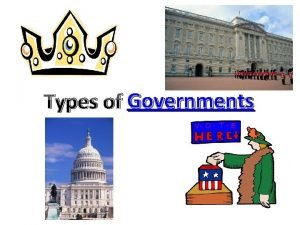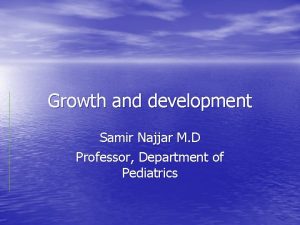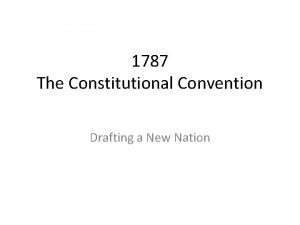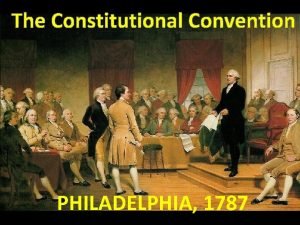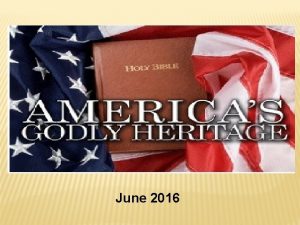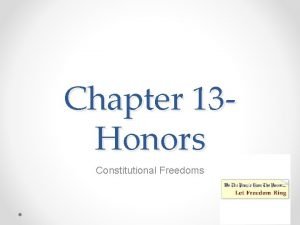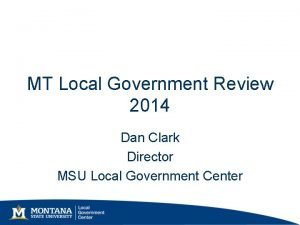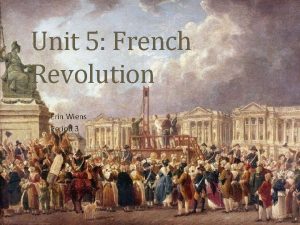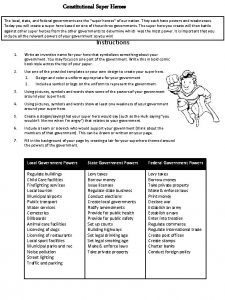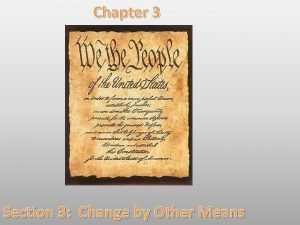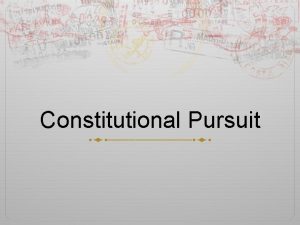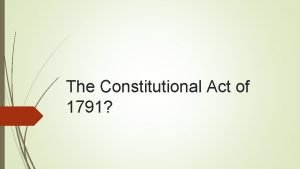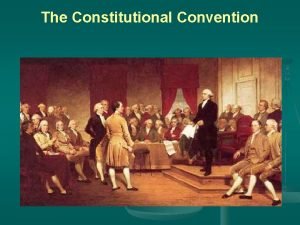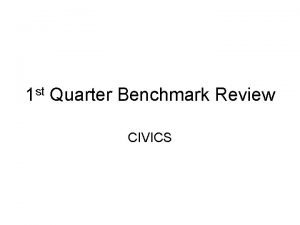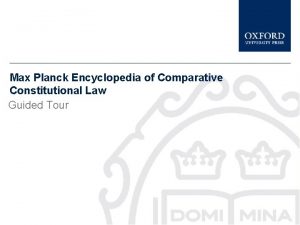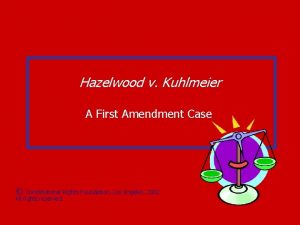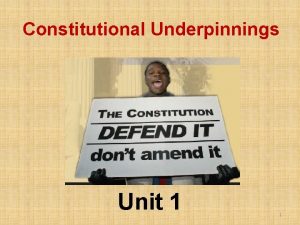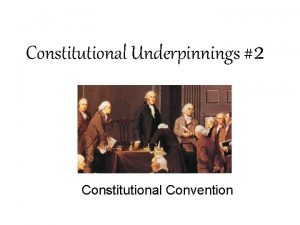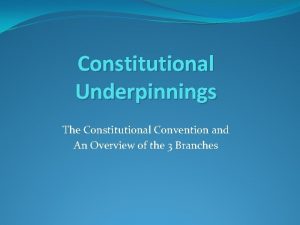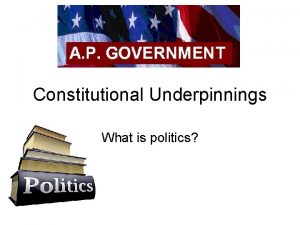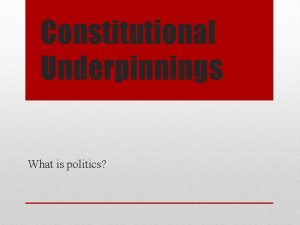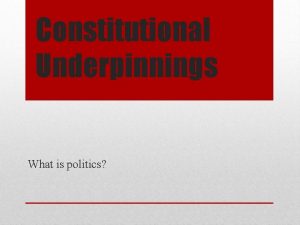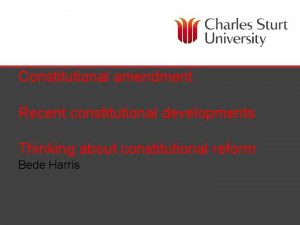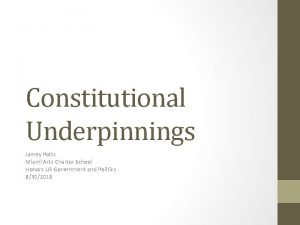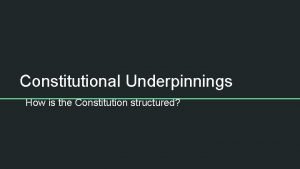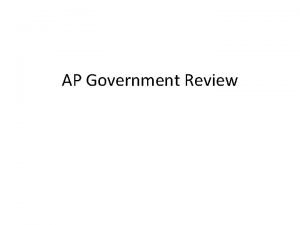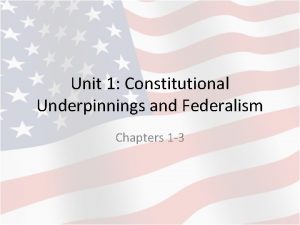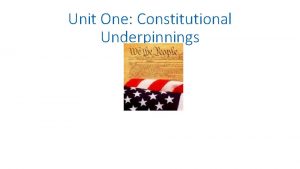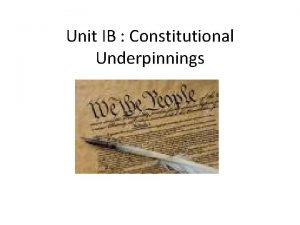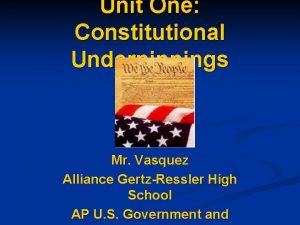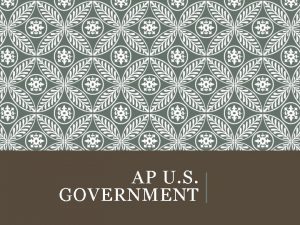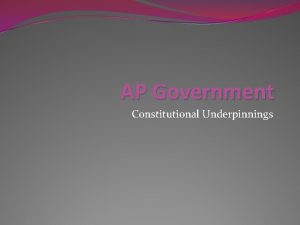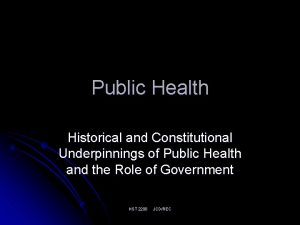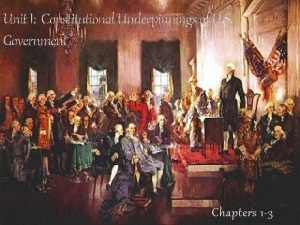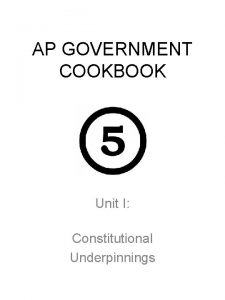Constitutional Underpinnings What is politics What is the














































- Slides: 46

Constitutional Underpinnings What is politics? What is the purpose of government?

Word Association • List words that come to mind when you hear the word “politics”. • Does the word “politics” have a more positive or negative connotation? Why? • Create a working definition of politics in your notebook that you will be able to refer to throughout the school year.

Politics Defined • social relations involving intrigue to gain authority or power • the study of government of states and other political units • the profession devoted to governing and to political affairs • the opinion one holds with respect to socially relevant questions • the activities and affairs involved in managing a state or a government http: //wordnet. princeton. edu/perl/webwn? s=politics

Purpose of Government • List at least five functions of government in order of importance in your notebook. (You may use examples of local, state, and federal functions. ) • Of the five functions you listed, which is especially relevant today? Why? • Of the five functions, which is the least relevant today? Why?

Machiavelli • Machiavelli’s name is synonymous with tough and dirty politics • Author of The Prince. One of history’s first political scientists.

Machiavelli Quotes Respond in writing to the following quotes by Machiavelli. Do you think these quotes are relevant today? • “The ends justify the means. ” • “It is better to be feared than loved. ” • “By no means can a prudent ruler keep his word. Because all men are bad and do not keep promises to you, you likewise do not have to keep your promises to them. ”

Can we be hopeful about politics? Politics is not about power. Politics is not about money. Politics is not about winning for the sake of winning. Politics is about the improvement of people’s lives. -Sen. Paul Wellstone 1944 -2002

A neutral view of politics Harold D. Lasswell • Who gets what, when, and how • All of us are political, we’re just not used to calling it that. You don’t have to take a class to get politics. Aristotle was correct when he wrote, “Man is by nature a political animal. ”

Primitive Politics • What definition of politics is best? Why? Political Theories deal with: – Authority – Legitimacy – Conflict – Compromise – Mob rule

Social Contract Theory • The only valid government is one based on the consent of the governed. – from John Locke • Rulers and citizens enter into an agreement, or a social contract • Government by the people, masses

John Locke’s Theory – Part I • State of Nature existed before government • State of Nature – people were naturally free and equal, but freedom led to chaos • Natural rights to life, liberty, and property were jeopardized

John Locke’s Theory – Part II • Social Contract – people desired protection of their natural rights so they form government to protect rights

John Locke’s Theory – Part III • Dissolution – If the government doesn’t adequately protect natural rights, the people have an obligation to dissolve government

Locke’s influence on the US • “A state also of equality, wherein all the power and jurisdiction is reciprocal, no one having more than another… - John Locke, of Civil Government • “We hold these truths to be self-evident: That all men are created equal. ” Thomas Jefferson, Declaration of Independence

What makes a Democracy? Principles necessary for a democracy to exist. 1. Universal Participation (everyone vote) 2. Political Equality (all votes counted equally) 3. Majority Rule 4. Government responds to public opinion

Is Democracy Evil? • “The masses are turbulent and changing and seldom judge or determine right. ” -Alexander Hamilton • “A democracy is a government in the hands of men of low birth, no property, and vulgar employments. ” -Aristotle

Do we live in a Democracy? • Q: What system of government do Americans have? • A: hint: not a democracy. • We live in a republic. – We are all (little “r”) republicans. – Our government is technically a Representative Democracy – Often referred to as a Democratic Republic

Majoritarian Democracy Theory • Theory stating majority rules and government should follow the wants of the people. • Community size makes this impractical. • Also called “Direct Democracy” • EX. – If every American was allowed to vote on every law, this would be a direct democracy.

Majoritarian Democracy Theory • Majoritarian Democracy is alive and well at the ballot box. – Recall – petitions used to “un-elect” a government official (This is how Arnold Schwarzeneger became governor of California. ) – Referendum – legislation placed on the ballot by representatives but is approved by the voters – Initiative – legislation placed on the ballot by the voters to be approved by voters

Pluralist Democracy Theory 1. Modern society consists of many groups (ex. Economic, religious, cultural, ethnic. ) 2. The different groups compete to press their interests in government. 3. Even if the average citizen does not keep up with politics, their interests will be protected by their group. 4. Political decision making is characterized by bargaining and compromise.

Arguments FOR Pluralism • There is no ONE majority in the US that thinks as ONE group. Therefore, the government can’t just aim to please a majority, they must aim to please as many groups as possible. • Groups must compete for government services and favorable laws.

Arguments AGAINST Pluralism • Relatively low numbers of people join interest groups. • Poor citizens have less opportunity to join interest groups or contribute to them. • One can’t assume that group decisions are always in the best interest of the nation.

Elite Theory • A small group of rich corporations run the US. Politicians require massive funding to win elections, and rely on corporations to supply them.

Hyperpluralist Theory • Pluralism on steroids – one group becomes more powerful than the government • Government does not function correctly – policy does not reflect the needs of the nation, only the desires of the group • Fragmented political system allows this to occurs

A Reminder… • These are only theories. They are people’s perception of our democracy and the way it functions. • Which theory is correct? ? ? – Pluralist – most popular today – Majoritarian – popular pre-1950’s – Elite – rising since the 80’s (Michael Moore)

Political Ideology Most Government Least Government POLITICAL THEORIES Totalitarianism Libertarianism Anarchy ECONOMIC THEORIES Communism Capitalism Free-enterprise Laissez-faire POPULAR LABELS IN THE UNITED STATES Liberal Conservative

Chapter One The Study of American Government

Two Key Questions • Who governs? How will those who govern will affect us? • To what ends? To what extent will government affect our lives?

What is Political Power? • Power: the ability of one person to cause another person to act in accordance with the first person’s intentions • Authority: the right to use power • Legitimacy: what makes a law or constitution a source of right

Kinds of Democracy • Direct democracy: A form of democracy in which most, or all, of the citizenry participate directly. • Representative democracy: A government in which leaders make decisions by winning a competitive struggle for the popular vote.

The Framers’ View • Government would mediate, nor mirror, popular views • People were viewed as lacking knowledge and susceptible to manipulation • Framers’ goal: to minimize the abuse of power by a tyrannical majority or by officeholders

Theories of Government • Marxism: Those who own the means of production, controlling the economic system, will control the government • Elitism: A few top leaders, drawn from the major sectors of the United States polity, will make all important decisions

Theories of Government • Bureaucratic: Appointed civil servants control the government, without consulting the public. • Pluralist: Competition among affected interests shapes public policy decisionmaking

Pluralism and Self. Interest • Is pluralist democracy driven by selfish desire? – policies can be good or bad, regardless of the motives of their proponents; – the belief that people always act in their own self-interest has been refuted in practice (e. g. - heroic actions of September 11 th, 2001) – public-spirited behavior was behind many of our greatest social movements (like the Civil Rights movement)

Political Leanings • Our country is made up of liberals, conservatives, and moderates. • Liberals are often associated with the Democratic Party • Conservatives are often associated with the Republican Party • Moderates are often associated with Independents

Political Spectrum Radical Liberal Moderate Conservative • �� Radical �� Liberal �� Moderate �� Left Reactionary Right

Liberal – Left of Moderate Liberal – Left Believe that the government should actively promote social reform to increase individuals’ well being. Favor change, but work peacefully within the existing political system. (Democrats, The Green Party)

Conservative - Right Side of Moderate Conservative – (Right) Believe that government should stay out of the lives of citizens and businesses except on moral issues. Most favor the status quo (the way things are) & are hesitant to change. Will work peacefully within the existing political system. (Republicans, Reform)

Moderate- Middle of the Spectrum Moderate – (Middle) Moderates are people who have opinions between liberal and conservative and may include some of both. They are generally tolerant of many viewpoints and generally don’t hold extreme views.

Radical - Far Left Side of the Spectrum • Radical – (Far Left) – Favor a rapid, fundamental change in the existing social, economic or political order. Will use extreme measures including violence to achieve their goals. (Communist)

Reactionary - Far Right of the Spectrum • Reactionary – (Far Right) Advocate a return to a previous state of affairs, often a social, political or economic order that existed earlier in history. • Will use extreme measures to achieve their goals including violence. (Dictatorships, Monarchies, Oligarchies) (Taliban, Nazis, etc…)

Liberal vs. Conservative Change vs. Tradition • Problems are circumstantial • Gov’t is responsible for social reform • Relative Values • Freedom – personal choices • Equality–fairness–level the playing field • Govt needs to be more involved in social issues • Human rights • Problems are Individual in nature • Individuals are responsible for social reform • Moral Absolutes determine appropriate behavior • Competition is good / Affirmative action is unnecessary • Gov’t needs to be less involved in social issues • Property rights

Ideology applied to issues • Pro-choice • Gay marriage • Flag burning • Pro-life • Heterosexual marriage • Flag burning amendment

Problems in society: Circumstantial vs. Individual Liberals (Democrats) Circumstantial • Welfare programs • Health care for all • Drug rehabilitation programs Conservatives (Republicans) Individual • Welfare limits • Private health care • Tough on crime

The role of government in society Liberals • Gov’t is responsible for social reform • Education funding • Assistance programs • Environmental protection Conservatives • Gov’t should be less involved • School vouchers • Charity tax deductions • De-regulation

Equality - Freedom • • Social equality Anti-discrimination Gender equity Affirmative action programs • • Individual freedom The right to hire Merit pay Encourage competition
 Constitutional underpinnings definition
Constitutional underpinnings definition Philosophical underpinnings of nursing
Philosophical underpinnings of nursing 3 methylhexane structure
3 methylhexane structure Compromises at the constitutional convention
Compromises at the constitutional convention Constitutional republic symbol
Constitutional republic symbol Constitutional convention role play
Constitutional convention role play Creating the constitution chapter 2 section 4
Creating the constitution chapter 2 section 4 Petition definition history
Petition definition history Annapolis convention apush
Annapolis convention apush Lesson 1 - the constitutional convention
Lesson 1 - the constitutional convention Constitutional act of 1791
Constitutional act of 1791 Six constitutional principles
Six constitutional principles Constitutional convention apush
Constitutional convention apush When did england become a constitutional monarchy
When did england become a constitutional monarchy Images of cultural and educational rights
Images of cultural and educational rights Diastereomers vs enantiomers
Diastereomers vs enantiomers Procedural vs substantive due process
Procedural vs substantive due process Halimbawa ng karapatang pulitikal
Halimbawa ng karapatang pulitikal Constitutional power
Constitutional power Constitutional convention definition
Constitutional convention definition Structural isomers of pentane
Structural isomers of pentane Constitutional development in pakistan from 1947 to 1973
Constitutional development in pakistan from 1947 to 1973 Constitutional isomers
Constitutional isomers When did england become a constitutional monarchy
When did england become a constitutional monarchy Examples of common law
Examples of common law 3/5 compromise cartoon
3/5 compromise cartoon Constitutional convention compromise
Constitutional convention compromise Constitutional monarchy pictures
Constitutional monarchy pictures 3 branches of government superheroes
3 branches of government superheroes Who governs a dictatorship
Who governs a dictatorship Samir najjar
Samir najjar Constitutional convention
Constitutional convention Constitutional convention compromise
Constitutional convention compromise Constitutional convention 1787
Constitutional convention 1787 Gitlow v new york constitutional question
Gitlow v new york constitutional question Right to constitutional remedies
Right to constitutional remedies Constitutional powers
Constitutional powers France constitutional monarchy
France constitutional monarchy Constitutional superheroes examples
Constitutional superheroes examples Chapter 3 section 3 change by other means
Chapter 3 section 3 change by other means Constitutional pursuit answer sheet
Constitutional pursuit answer sheet Constitutional convention article 5
Constitutional convention article 5 Constitutional act of 1791
Constitutional act of 1791 Constitutional convention begins
Constitutional convention begins Characteristics of constitutional democracy
Characteristics of constitutional democracy Max planck encyclopedia of comparative constitutional law
Max planck encyclopedia of comparative constitutional law Hazelwood school district v. kuhlmeier arguments
Hazelwood school district v. kuhlmeier arguments
